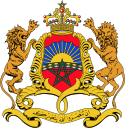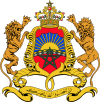Parliament of Morocco
Parliament of Morocco البرلمان | |
|---|---|
| Type | |
| Type | |
| Houses | House of Councillors House of Representatives |
| History | |
| Founded | August 2, 1956 (Non elected chambers in 1904, 1908, 1919, 1947, and 1951)[1] |
| Leadership | |
President of the House of Councillors | |
President of the House of Representatives | |
| Structure | |
| Seats | 515 members 120 councilors 395 representatives |
 | |
House of Councillors political groups | Government (63)
Support (9) Opposition (48) |
 | |
House of Representatives political groups | Government (270)
Support (23) Opposition (102) |
| Elections | |
| Indirect election | |
| Mixed member majoritarian (Single non-transferable vote for 305 seats, 60 seats reserved for women and 30 seats reserved for young people under 40 by proportional representation) | |
Last House of Councillors election | 5 October 2021 |
Last House of Representatives election | 8 September 2021 |
| Meeting place | |
 | |
| Rabat, Morocco | |
| Website | |
| www | |
 |
|---|
| Judiciary |
|
|
The Parliament of Morocco (Arabic: البرلمان) is the bicameral legislature of Morocco. It is located in Rabat.
History
[edit]The traditional representative system in Morocco was organized through traditional structures such as the ulema assembly by cities and regions, or the Jemaa assembly within the tribes. These structures were not elected, but nominated through a cooptation system.
Starting from 1880, Morocco began a range of reforms to adapt its institutions to modern standards. Among these reforms the creation of the position of grand vizier, having a structured and durable cabinet, with six ministries, including foreign affairs, finance, defense etc. In the process, the Sultan Abdelaziz decided to create a consultative assembly in 1904, which he named Majlis el Aayane (مجلس الأعيان).[4] It is this assembly that summoned the international conference of Algeciras, and that drafted the constitution of 1908, which never entered into force because of the political unrests.
The Majlis el Ayane was dissolved in 1913, as a result of the Treaty of Fes, which established the French Protectorate. But since 1947, on impulse Erik Labonne, Resident General of France in Morocco, and the Sultan Muhammad V, the protectorate creates consultative chambers reserved for Moroccans, Jews and Muslims. These elected chambers, through the elections of 1947 and 1951, were in reality only a weak response of the protectorate system to the nationalists claims expressed en 1944 manifesto of independence. The Istiqlal who accept to participate in the 1947 elections, earning three elected representatives, eventually boycott the 1951 elections.
At the end of 1955, and after the return from exile of Sultan Mohammed V, November 16, and the victory of nationalists, Morocco adopted in a first step, a non-elected parliament, resulting from consultations with the main political parties to lay the foundations for future elections. The first chamber was chaired by Mehdi Ben Barka. The first Moroccan Constitution adopted in 1963 created a bicameral parliament consisting of the House of Representatives and House of Councillors.
The 1970 Constitution abolished the bicameralism legislature and established a unicameral parliament.
The 1992 Constitution established the introduction of inquiries of investigation.
Elections
[edit]The 2011 Moroccan general election witnessed the Islamist party, the Justice and Development Party (PJD), winning the largest number of seats, making up 22.78% of the parliament.[5][6] It remained the largest party after the 2016 general election, winning 125 of the 395 seats in the House of Representatives, a gain of 18 seats from 2011.[7][8] Abdelillah Benkirane was reappointed Prime Minister by the King on 10 October.[9] The Authenticity and Modernity Party (PAM) won 102 seats, and the remainder were split among smaller parties.
In the 2021 Moroccan general election, the PJD suffered an electoral wipeout,[10] with the liberal National Rally of Independents becoming the largest party in Parliament.[11][12][13] Its leader, Aziz Akhannouch, subsequently formed a coalition government with the PAM and Istiqlal Party.[14][15][16]
Composition
[edit]Since 1996, the national legislature has become bicameral and has therefore two parliamentary chambers:
- The House of Representatives or the lower house. 395 members elected directly for a five-year term.
- The House of Councillors's 120 members are elected indirectly for a six-year term by two sets of electoral colleges.
Members of parliament come from Morocco and the Moroccan-controlled parts of Western Sahara (the Southern Provinces).
Reserve power
[edit]Part of the reserve powers, the King of Morocco, who is head of state, has the right to dissolve the Parliament. In the past, during the "years of lead" under King Hassan II, this right was used extensively, along with suspensions and extensions of terms, and a "state of exception" lasting from 1965 through to 1970. Thus, until 1997, no elected Parliament was able to complete its term under normal circumstances.[17]
Role
[edit]The role of Parliament, and the respect of the monarchy for its integrity, has increased considerably since 1999, when Mohammed VI took the throne. However, the power of Parliament is still being limited as it is the King who appoints the prime minister and on proposition from the latter, the members of government. Since the adoption of the 2011 Constitution, the King is required to appoint a prime minister from the party which wins the most seats following a parliamentary election.
See also
[edit]- Politics of Morocco
- Elections in Morocco
- List of political parties in Morocco
- List of legislatures by country
References
[edit]- ^ (in French) L'assemblée Nationale Consultative Marocaine
- ^ "Mohamed Ould Errachid (PI) élu à la présidence de la Chambre des conseillers pour la seconde moitié de la législature 2021-2027". MAP news. 12 October 2024. Retrieved 12 October 2024..
- ^ "16/01/2017: Habib El Malki elected President of the House of Representatives, on Monday 16 January 2017". Chambredesrepresentants.ma. 16 January 2017. Retrieved 2017-03-07.
- ^ "L'Istiqlal : Parti De L'Independencve Du Maroc : Mémoire sur le Régime représentatif au Maroc avant et après le Protectorat" (PDF). Bnm.bnrm.ma. Retrieved 2017-02-22.
- ^ MEKHENNET, SOUAD; BAUME, MA (2011-11-26). "Moderate Islamist Party Winning Morocco Election". The New York Times. ISSN 0362-4331. Retrieved 2023-10-07.
- ^ "Islamist PJD party wins Morocco poll". BBC News. 2011-11-26. Retrieved 2023-10-07.
- ^ "Islamist PJD party wins Morocco poll". BBC News. 2011-11-26. Retrieved 2023-03-09.
- ^ "Morocco's moderate Islamist PJD party wins 107 seats". Al Arabiya English. 2011-11-27. Retrieved 2023-03-09.
- ^ "Moroccan king reappoints Abdelilah Benkirane as PM". www.aljazeera.com.
- ^ Guardian, The (2021-09-09). "Morocco elections: Islamists suffer losses as liberal parties gain ground". The Guardian. ISSN 0261-3077. Retrieved 2023-03-09.
- ^ and Jasper Hamann, Khouloud Haskouri. "RNI Sweeps 2021 National Elections as PJD Support Disintegrates". moroccoworldnews. Retrieved 2023-03-09.
- ^ "Islamists suffer crushing defeat in Moroccan parliamentary elections". France 24. 2021-09-09. Retrieved 2023-03-09.
- ^ "Morocco's ruling PJD routed as liberal parties sweep parliamentary elections". RFI. 2021-09-10. Retrieved 2023-03-09.
- ^ "Morocco parties announce coalition government deal". Africanews. 2021-09-22. Retrieved 2023-03-09.
- ^ "Morocco's premier Akhannouch announces coalition agreement". www.aljazeera.com. Retrieved 2023-03-09.
- ^ "Parliamentary Groups and Caucuses : 2021-2026". 13 September 2021.
- ^ "THE MOROCCAN PARLIAMENTARY SYSTEM". 15 June 2002. Archived from the original on 15 June 2002.

